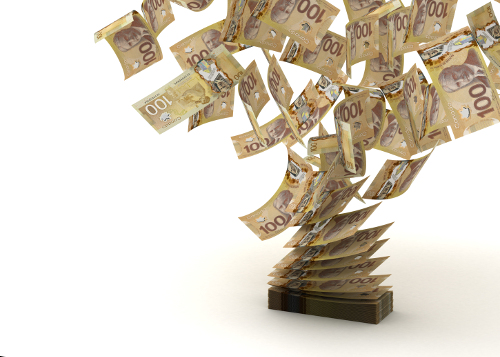What Are Your Bad Habits Really Costing You?
By Julie Jaggernath
We all like our habits, in fact, people in general are known to be creatures of habit. You can likely list off a few of your own habits, good and well, not so good. We all have them, and the difference between engaging in what might be deemed a bad habit occasionally, versus on an ongoing basis, that’s where the implications reveal themselves.
If you’ve ever tried to break a habit, as a New Year’s resolution or anytime throughout the year, you know how hard it can be. But taking it one step further, have you ever considered the long-term financial consequences to your spending habits? Maybe you grab a lotto ticket each time you pick up a few groceries. The $5-$10 is likely an amount you wouldn’t even notice missing if you only spend it occasionally. But spending $10-$20 a week, every week, year after year, the lifetime cost would be significant.
What makes a habit good or bad often depends on how often you engage in it. The 4 habits below tend to fall towards the bad habit side by the way they add up big time with little to show for the money. See what you think…

1. Smoking (Anything)
Most smokers know that their habit is expensive, but at $12-$15 for a package of cigarettes many don’t like to calculate the exact costs of their bad habit. If you are a steady smoker and buy 5 packs of cigarettes a week, each week all year, for 45 years, not accounting for inflation or other factors, you are literally burning through $140,000 to $175,000 (or more, depending on what you smoke or vape)! Check out this cost calculator to get a better idea about how much you spend on smoking. That’s a pile of cash you could do less damage with elsewhere!
2. Wine, Beer and Spirits
Beyond the obvious health and psychological downsides of drinking too much alcohol, the toll it takes on your finances can be in the hundreds of thousands of dollars. You wouldn’t notice this right away with the casual drink after work or meeting friends at the pub sometimes.
There’s a lot of variation with how people consume their drinks, but take a look at how it adds up with this example: 2 drinks with tax and tip comes to $20 – $25. Let’s say that’s a once-a-week expense. Add a six-pack of beer or bottle of wine for $15 four days a week, that’s another $60 each week. If you were to keep this up for most of your adult life (55 years), a very conservative calculation brings that total to over $225,000! What else could you do with even half that much money?
3. Casual Betting and Buying Lotto Tickets
Have you ever considered your casual betting habits? The hockey pool, Keno, bingo, 50/50 draws, a friendly game of poker, picking up the odd scratch ticket, or buying raffle tickets – even if you win here and there, on average you likely spend more than you get.
Playing any type of a lottery is a form of gambling, and the stakes only go up if you have a subscription for lotto tickets that bills directly to your credit card, or if you gamble online; mot to mention, your expenditures likely outweigh your winnings by a sizeable margin. Kids are even getting hooked with the buying and selling of video game assets for real world money.
The best way to win when you gamble is to factor it into your budget. A trip to the casino? Decide ahead of time how much you can afford to lose, and plan for it. Don’t bank on winning; your budget must balance even if you come home empty-handed.
Don’t Plan on Funding Retirement with a Big Win
If you are struggling with debt because you think you may have a problem with gambling, you definitely aren’t alone. Contact the BC Responsible and Problem Gambling Program for help with gaming issues, or search for a similar program in your province or territory. Our Credit Counsellors are available to help you with your debts and referrals if you need them. If you have extended health benefits through work, consider psychological counselling to help get yourself back on track emotionally. Mental health and substance use support is available across Canada. Visit your province’s health website or ask your family doctor for a referral.
4. Not Paying Off Credit Cards Each Month in Full
Not paying off your credit cards in full each month, are you surprised that this made the list? Carrying a balance from month to month is an extremely costly bad habit most people don’t even realize they have. On top of the tens of thousands of dollars in interest you will pay extra in addition to every item you purchase with your credit cards, you could be affecting your credit rating. If your credit score drops because of how you use your credit cards you will face higher interest rates with other loans or even your mortgage.
Think about what you owe on your credit cards. Someone who has accumulated about $15,000 of debt on credit cards charging 19.9 percent interest (APR), if they were to not use the cards anymore and only make the required two percent minimum payment, it would take them the rest of their life, 92 years, to pay them off! They would also pay $70,952 in interest. That’s almost $86,000 for stuff you likely hardly remember buying.
On the bottom of credit card statements in Canada is a disclosure statement which tells you how long it will take to pay off your credit card debt in full if you only make minimum payments. Take a look at your last statement – if you don’t like what you see, do something about it right away with the most effective ways to pay down credit card debt.
Is Picking on Bad Habits Making You Nervous?
It’s easy to pick on the big bad habits, but low cost habits add up too. They can’t be ignored because they add up a little at a time until you’ve got a big debt to deal with. Low cost habits are one of the main reasons why someone’s budget fails.
If your budget isn’t lining up and you find yourself running short each month, take a look at your habits by tracing what you spend for a few weeks. This will identify where you are spending more than you thought you were. Once you know, you can make some changes that will get you back on track to achieving your financial goals.
Replacing Bad Habits with Good Habits
Taking away a habit is only half the deal; you need to replace it with something else so that you’re not tempted to fall back into the habit you are trying to change. Focus on replacing bad habits with good ones, which have their inherent benefits. For instance, a habit of saving for retirement with the money you no longer spend on lotto tickets means that you’ll see the balance in your RRSP grow. An exercise habit will reveal itself through your level of fitness.
How to Make Changes to Your Spending Habits
If you have expenses that you want to eliminate, start by cutting them by half. If that works for you for a few weeks, reduce them by another half. Eliminate them totally after a few more weeks if that’s the route you want to go, but that’s not always realistic. A glass of wine with dinner, a night out, or chipping in for the 50/50 fundraiser at school – leave room in your budget to sanity expenses and some fun. Getting a better handle on your money means creating a realistic personal or household budget. Working up to big lifestyle changes, rather than doing anything cold turkey, sets you up for success. And success simply feels better.
Related Articles:
Is This Missing in Your Plan to Become Debt Free?
Easy, Interactive Budget Calculator
3 Credit Rating Myths Explained
How to Stop Spending Money



0 Comments